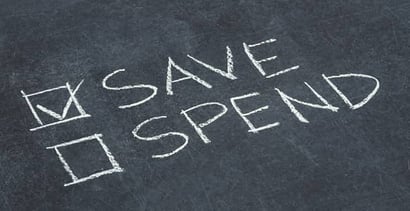

So you paid all of your bills for the month and set aside the money you need for the rest of your budget, and low and behold you have some available money left over!
Great! The question is what do you do with it?
When it comes to saving, you can’t be as general as putting it away in a savings account for a rainy day or letting it linger in your checking out.
If you don’t tell your money where to go, it will find a way to spend itself.
Just like all of your other expenses that come out of your account have a purpose, so do your savings. Let’s look at three ways that will help give your savings a rhyme and reason.
1. Emergency reserves
This is the “life happens,” “what if,” “buffer” and non-revolving expense account.
Each month you will allocate a portion of your surplus cash flow toward this account. This is for things like vehicle maintenance, vehicle taxes, home repairs, insurance deductibles, veterinarian visits, etc.
People often say the reason why they have trouble budgeting is because something always comes up. Well, you can budget for that, too.
This account may also simply serve as a buffer if things within your regular budget don’t go as planned (bought one too many drinks at the bar).
You don’t always know how much these expenses will cost, nor when they will occur, but allotting money toward an account that can be used to offset those costs as they arise will certainly put you in the driver’s seat and give you more control over how things play out.
“Just like you, your money
needs a direction and a focus.”
2. Emergency fund
I have heard the term emergency fund used in many different ways.
A lot of people think of it as a “rainy day” fund you can use to help with all of the stuff I just mentioned. Some people even think if necessary, your 401(k) is an emergency fund (bad idea).
An emergency fund is and always should be three- to six-months worth (or more) of your living expenses, only to be used if you get laid off or fired from your job.
Naturally, if you get laid off, certain luxuries like ongoing entertainment or dining out would be reduced. However, your fixed expenses and some of your variable expenses will still need to be covered.
A portion of your surplus should be allocated toward building up your emergency fund.
You can make a judgment call on what expenses you feel you would completely eliminate if laid off and build your emergency fund number around that (i.e. a gym membership or magazine subscriptions).
3. Major expenses
When creating a budget, it’s realistic that you allot money for monthly entertainment, such as going to the movies or even a shopping budget for things you may need to purchase on a regular basis.
However, there are some things you either wouldn’t (hopefully) just go out and buy on a whim or the amount needed for that expense is far greater than you could save in a month’s time.
For those expenses, you will want to have a major expense account. This is the account where you will save for things such as vacations, furniture, appliances, electronics or maybe even a down payment on a home.
These are expenses you have identified that will happen in the future, and you are allotting money every month to be able to use when these expenses arise.
If you separate your money this way, you are giving every dollar a purpose and there’s no longer just a general surplus of cash sitting in your checking or savings account with nowhere to go.
If you really want to make this work, try setting up automatic transfers to these three accounts or even setting direct deposits up through your employer so you don’t have to worry about forgetting to do it.
They make you choose a major when you go to college because just like you your money needs a direction and a focus.
Photo source: financesonline.com
Advertiser Disclosure
BadCredit.org is a free online resource that offers valuable content and comparison services to users. To keep this resource 100% free for users, we receive advertising compensation from the financial products listed on this page. Along with key review factors, this compensation may impact how and where products appear on the page (including, for example, the order in which they appear). BadCredit.org does not include listings for all financial products.
Our Editorial Review Policy
Our site is committed to publishing independent, accurate content guided by strict editorial guidelines. Before articles and reviews are published on our site, they undergo a thorough review process performed by a team of independent editors and subject-matter experts to ensure the content’s accuracy, timeliness, and impartiality. Our editorial team is separate and independent of our site’s advertisers, and the opinions they express on our site are their own. To read more about our team members and their editorial backgrounds, please visit our site’s About page.




